West Columbia Police Capt. Marion Boyce remembers the ongoing calls from someone who believed cows were walking around in her attic. She would call the department six or seven times a night. Each time, the dispatcher would send a patrol car to her home where officers would explain there were no cows in the house.
This was one example of a larger concern. Of the 36,000 calls the West Columbia department
received each year, about one-third to one-half were related to mental health or substance abuse issues. Many of those were repeat calls to the 911 system by community members with chronic issues.
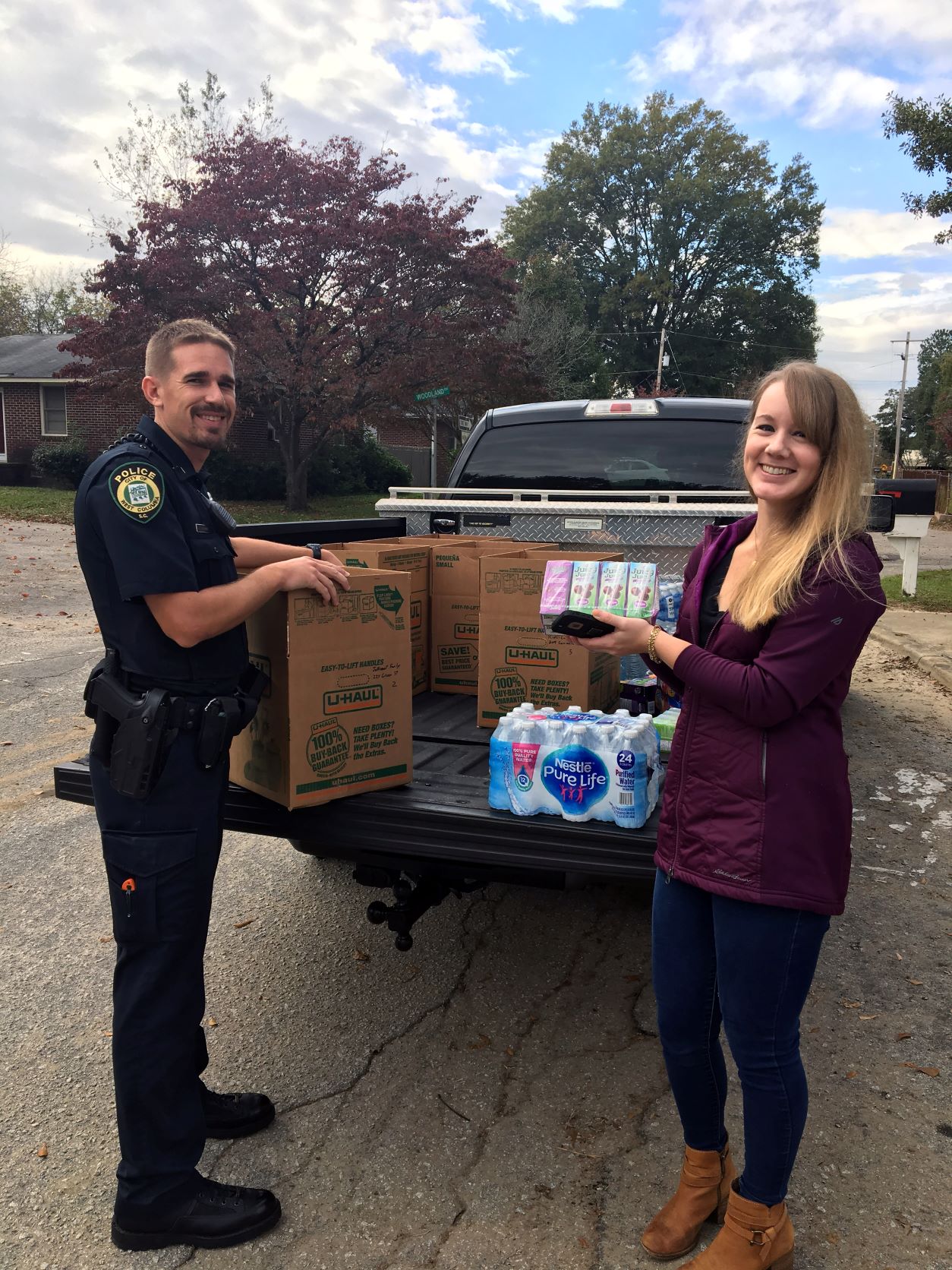
In addition to its outreach program to connect residents with needed resources,
the West Columbia Police Department has also conducted food drives.
Photo: City of West Columbia.
“That’s time, resources, fuel costs. When I’ve got a unit tied up for an hour — five, six, seven times a night at one location — it’s difficult to justify. But we have to go because we serve the public,” Boyce said.
The department began working with the University of South Carolina College of Social Work, to develop a program that has changed the way the department operates and follows up with residents.
“As social workers, we were sharing a lot of the same types of clients. Social workers and police officers have the same goal — to help people, families and communities,” said Rhonda DiNovo, a
licensed master social worker and clinical assistant professor in the UofSC College of Social Work.
“Rather than just responding to a 911 call, which is what the officers are trained to do, we talked about what if we could follow up with [callers] to see what’s really going on,” she said. “The officers can de-escalate them and be sure the person was safe and the community was safe. But beyond that a social worker could follow up with a phone call and say, ‘Hey, we
care about you. We see that you’ve had contact with law enforcement recently and we just want to see what’s going on.’ And then we can even link them to some local resources to address some of these issues so we don’t have to continue using the emergency 911 system.” Now in its sixth year, the West Columbia Outreach Program places social work graduate
students in the police department, using a screening, intervention and referral treatment
model to reach out to community members who have had contact with law enforcement. The social workers then are able to refer people to appropriate services including counseling, food banks, shelters or other advocacy and assistance groups.
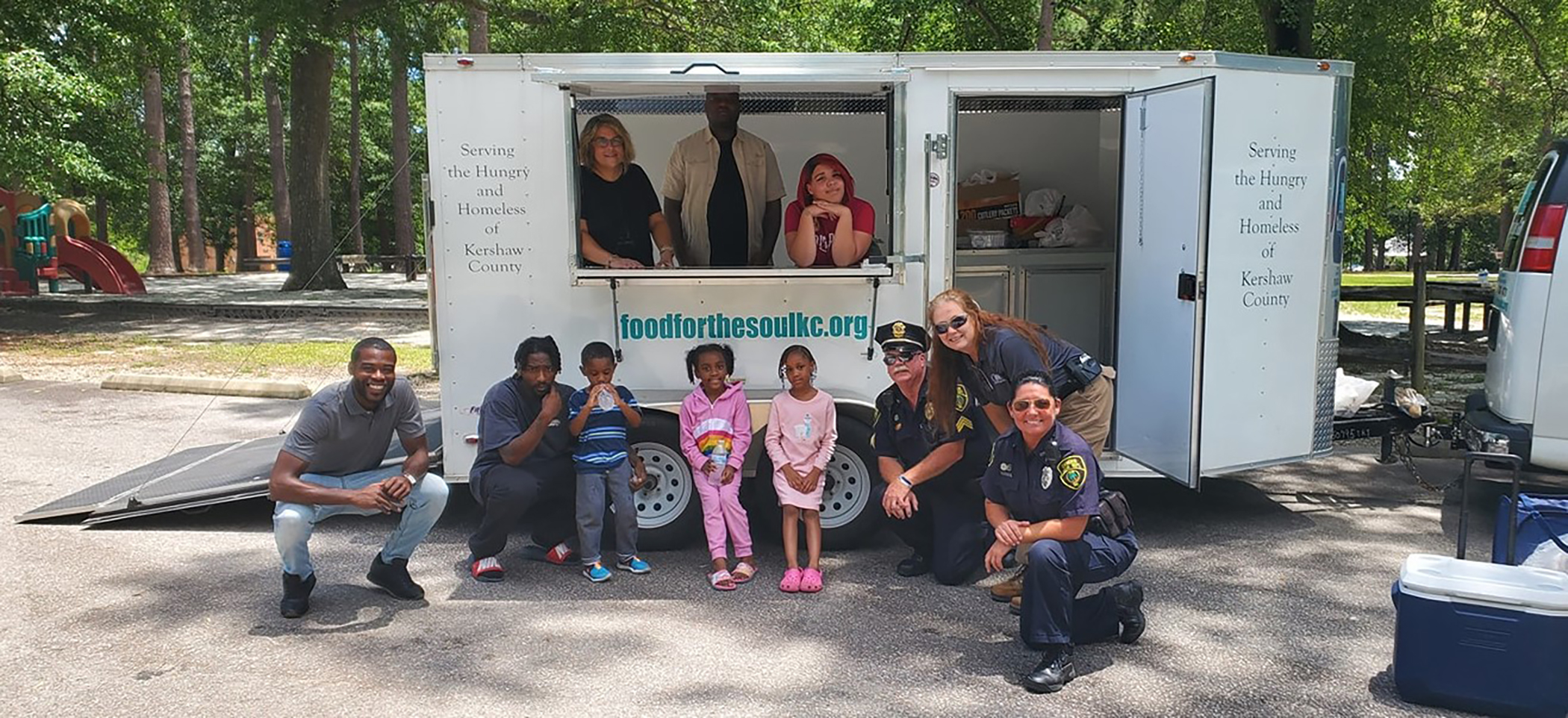
In addition to its outreach program to connect residents with needed resources,
the West Columbia Police Department has also conducted food drives.
Photo: City of West Columbia.
The program is one of the ways police departments around the state are reaching out to the community in ways beyond traditional law enforcement. From mental health outreach to special events and food programs, engagement efforts among police departments have expanded in recent years to improve relationships with the public.
“Modern-day American policing is not getting any easier. We are tasked with wearing many hats,” Boyce said. “This program works well for us and it helps our police officers. Early on, if someone had a mental health or substance abuse issue, we only had two options — take
them to the ER or take them to jail. That has changed drastically. There are so many more options that officers going out now have. I’m proud we can provide this to our citizens here in West Columbia.”
In Camden, the Community Oriented Policing Services division helps connect people with food, shelter and mental health treatment. The COPS program officers wear the same uniforms as others in the department, yet they are strictly non-enforcement members.
The efforts began with a successful grant application with the U.S. Department of Justice Community Oriented Police Services Hiring Program in 2016 that paid for two officers’ salaries and benefits. That was followed by another three-year round of funding in 2019 that helped the program expand to three full-time officers. The city provides funding for some program needs, and the department also partnered with Serve & Connect, a nonprofit which focuses
on improving police relationships and helping underserved neighborhoods.
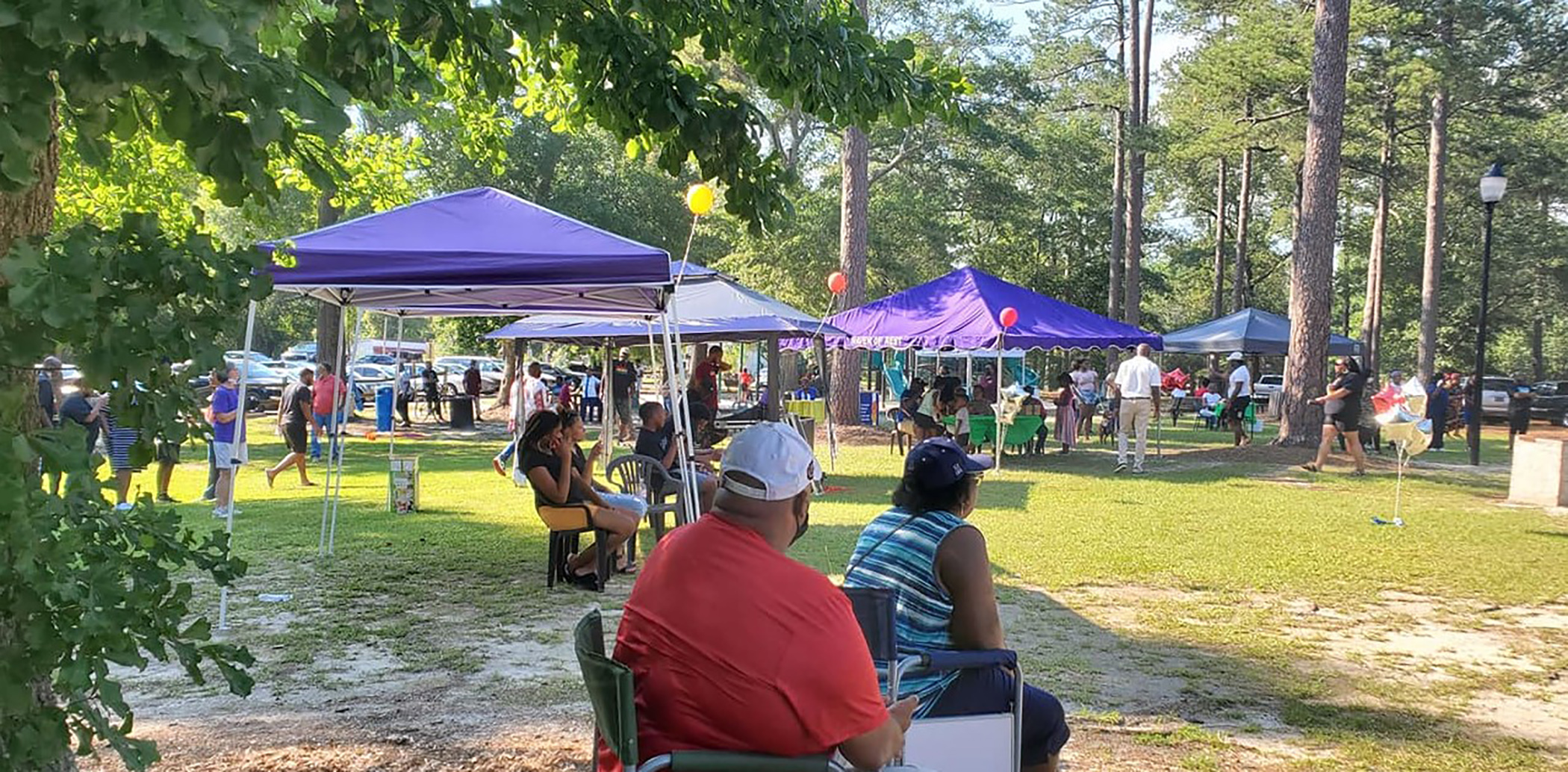
Camden Police participate in a 2021 Juneteenth celebration. Below: Camden officers
help with the “Food for the Soul” distribution. Photos: City of Camden.
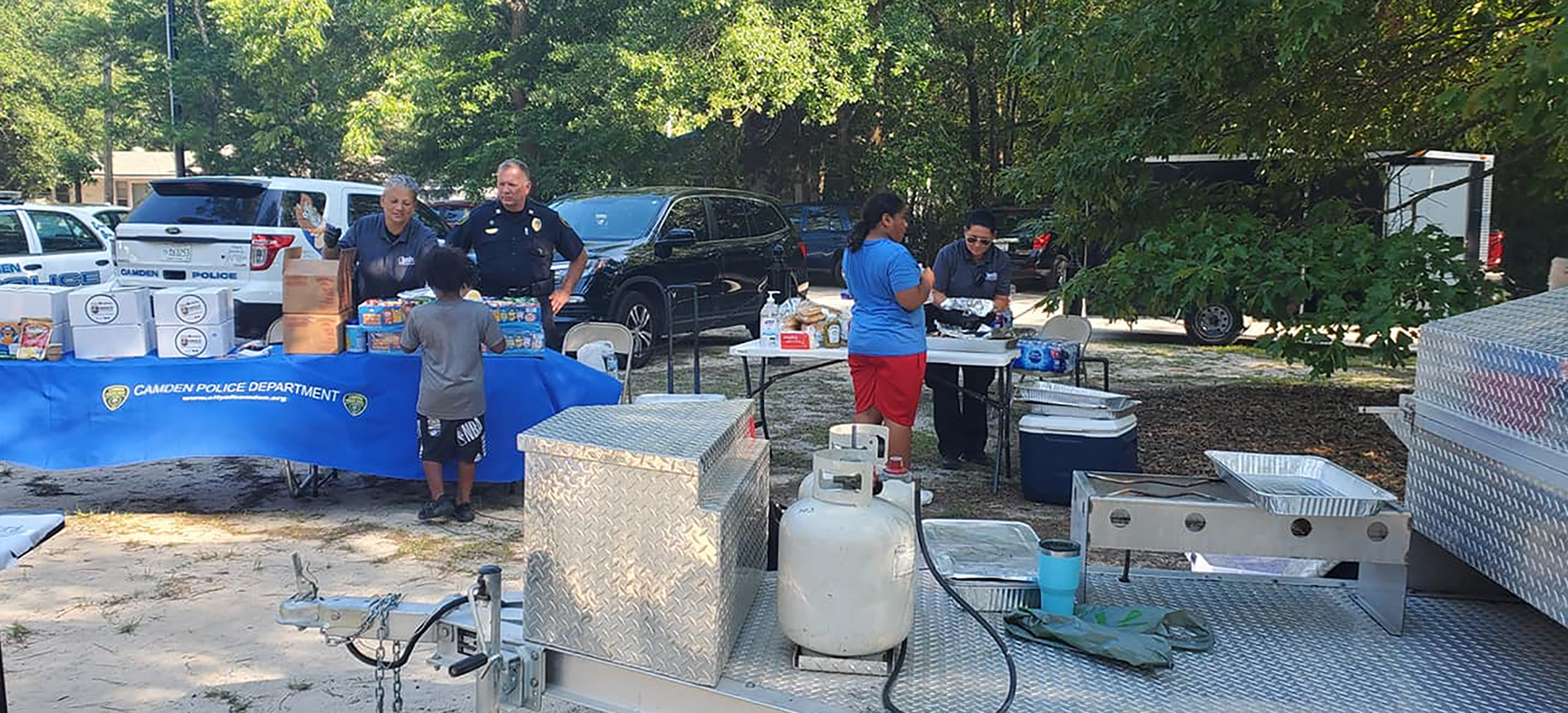
“The Camden Police Department has always had a community policing foundation. Chief Joe Floyd recognized the intrinsic value of community trust when he first came to Camden as the police chief. So, over the years, we have had singular officers tasked with community outreach,”
said Lt. Penny Lloyd with the Camden Police Department. “The grants allowed us to establish a stronger, formalized unit. This was very important to us, as we were aware of a few pocket neighborhoods that were less inclined to reach out to us or to help us solve any cases that came up. We wanted to begin focusing on these areas for outreach to ensure that all of our community members were aware of the public services we offer and felt comfortable talking with us about anything they were experiencing in general, reporting crimes, or even just waving ‘Hello.’”
Sgt. Carl Smith is one of the pioneers of Camden’s COPS activities, coming up with the Police in the Park concept and securing donations for free hot dog meals in the park, along with school supply giveaways and other activities.
Along with increasing participation in organized events, the COPS program has also helped residents feel more comfortable interacting with law enforcement.
“Most crimes are committed because of underlying factors: economic problems, addictions, mental health challenges, food insecurity, or single parenthood,” Lloyd said. “Once we began to get out and just chat freely with community members, we began to understand how to assist them in their daily lives. When people’s daily lives are secure and healthy, crime rates tend to be lower. This information led to us collaborating with many other city and county agencies to bring services into our neighborhoods during our events. When people’s needs are met, everything begins to improve.”
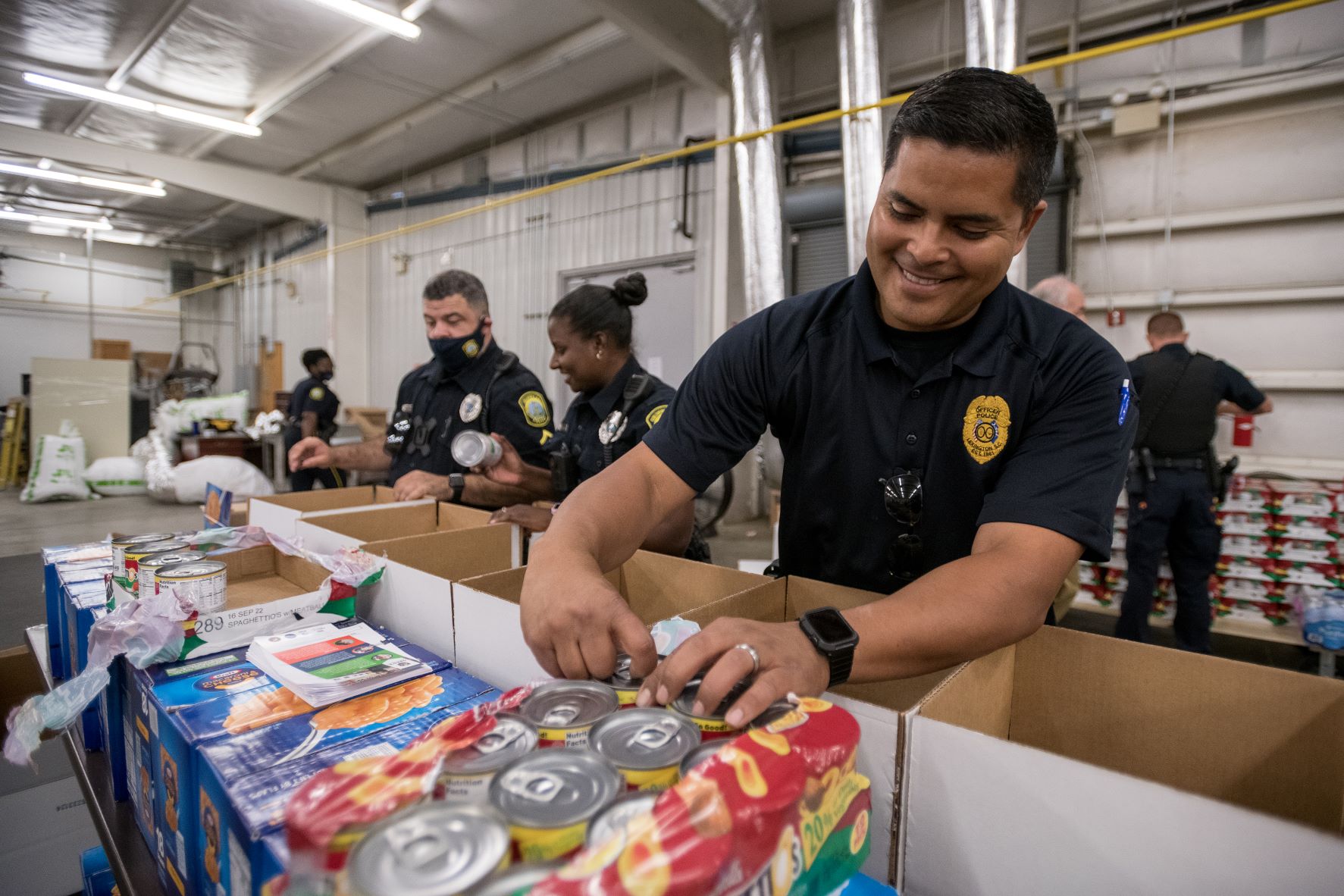
Officers from Columbia and Lexington pack food for Greg’s Groceries, a program started by
Serve & Connect to help police departments connect food with people experiencing hunger.
Photo: Serve & Connect.
Serve & Connect has played an important role in helping cities and towns reach out statewide. The group was founded by Kassy Alia Ray, whose husband Greg Alia was a Forest Acres police officer killed in the line of duty. It works to improve relations between departments and underserved communities through a variety of educational and hands-on efforts.
One of those programs, Greg’s Groceries, provides boxes of non-perishable food to police departments to help people experiencing hunger.
“Every police department we have encountered says that partnerships are important to them. Yet, departments range in their ability to engage in effective community policing whether
it be because of resources, manpower or other challenges,” Alia Ray said. “Through Greg’s Groceries, we can meet departments where they are and help them implement strategic plans that support them in assisting people in need and building long-term relationships that promote safety, well-being and resilience.”
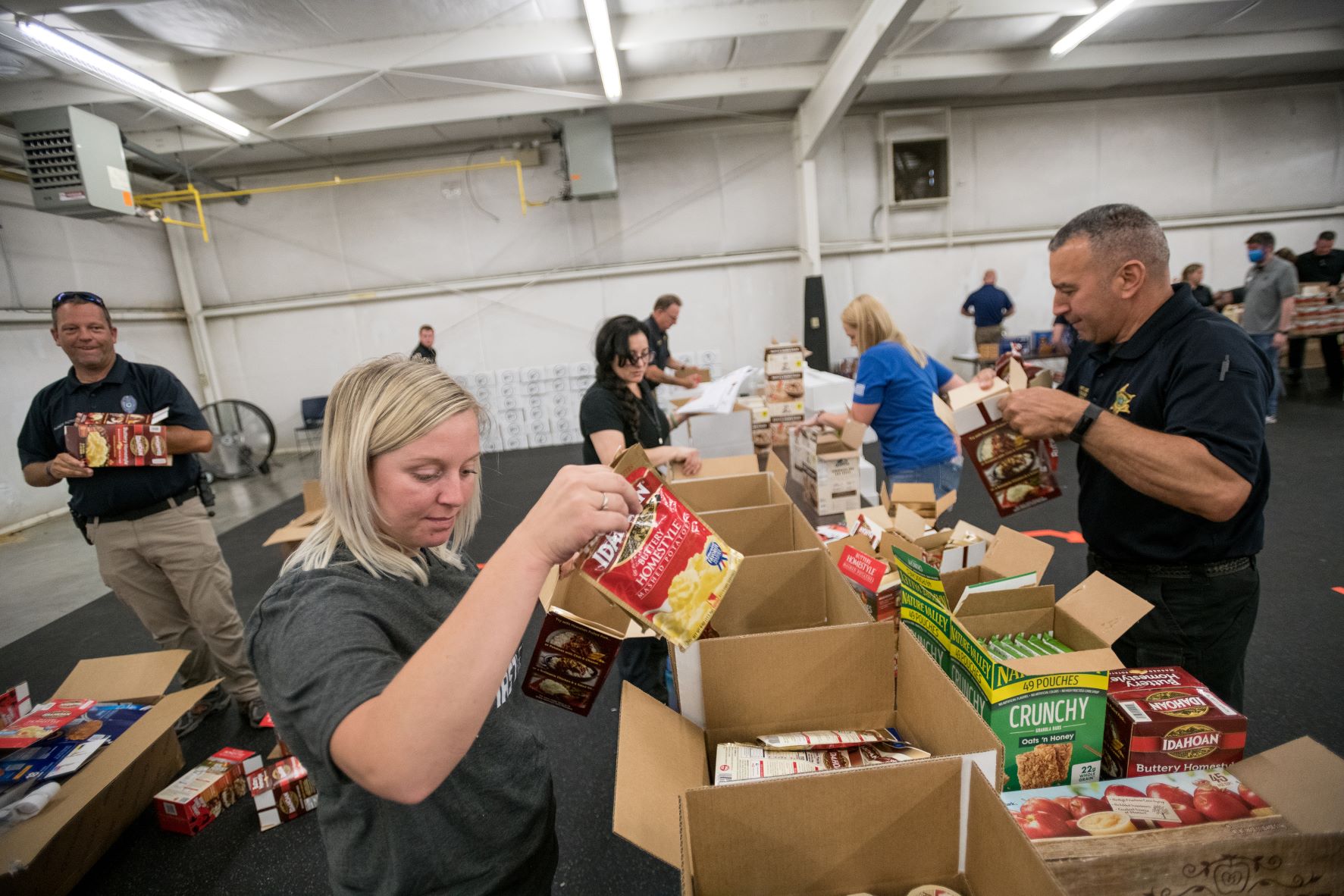
Through Greg’s Groceries, more than 88,000 meals have been delivered by
police to food-insecure people. Photo: Serve & Connect.
Police departments statewide can provide boxes of food while out on calls, through referrals or as part of strategic community policing outreach.
So far, Serve & Connect has worked with 33 police departments statewide, and the organization hears from more departments each week who want to join the program. More than 4,200 boxes — with about 88,000 meals — have been delivered by police to people living in food insecure areas.
Timmonsville is one of the new police departments participating in the Greg’s Groceries program. When Timmonsville Police Chief Thomas McFadden learned about the program, he said he knew it would offer a chance to help his small department have a positive interaction
with community members.
“I’m always trying to give back to the community. There are a lot of people in need, whether they say it or not,” said McFadden, who has been the police chief since December 2020.
He said the department put information about the Greg’s Groceries food distribution on Facebook.
“We had about 40 that first day. I held back 10 for needy families I knew that weren’t on Facebook. We delivered those,” he said. “Most of the time when people see law enforcement, it’s a 911 call or an accident. We want positive interaction. After we did the boxes, we got even more waves, even more people saying, ‘Hey Chief.’”
Recent community policing trends all center around the same goals — building community rapport and creating positive interactions — and for many departments, the outreach toolkits are growing.
